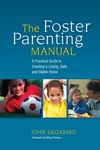
After a few foster children had passed through my own home, I began to appreciate the fact that I had to not only adjust my teaching habits for foster children, but I also had to become my own foster children’s advocate at their own schools. I watched my foster children struggle in my fellow teacher’s classrooms, and also was witness to these same teachers as they failed to understand the various emotional challenges the children in my home were going through on a daily basis. To be sure, there were those times when I had to politely intervene on behalf of my foster child. There were also those times when I had to sit across the table from a fellow teacher as we discussed how my foster child’s behavior was interfering in the classroom setting. My desire to better assist both my colleagues and foster children led to my doctoral studies on the subject. I simply wanted to help foster children succeed in school, as well as bring awareness about their struggles to our schools.
Foster children, in general, tend to perform below level in regard to both academic performance and in positive behavior than those students who come from either traditional homes as well as children from economically disadvantaged homes. The majority of children under foster care supervision experience problems in behavior while enrolled in public schools. Those foster children who were taken from homes due to neglect repeatedly suffer from a number of developmental delays. These include poor language and vocabulary development, thus impairing communication skills.
Join the thousands who receive Dr. DeGarmo’s FREE foster care newsletter. Simply fill out the form below
Since foster children are often behind academically, as well as struggle with the fact that they are coming from outside school districts with different expectations, teachers in your child’s school need to be conscious of this fact. Foster children struggle with many personal and emotional issues while in the foster home, and homework is often not the main objective while in the home each evening. Instead, the emotional issues your child faces may take center stage on a particular evening. Teachers need to assign homework with this in mind, being sensitive to their issues. Let your child’s teacher know this, and ask that they cooperate with you on this. Meet with the teachers, the school counselor, and perhaps even an administrator of the school when you enroll your foster child, and explain these concerns to them. Like I was beforehand, it is highly likely that they have not had much experience with foster children, nor the challenges they face.
As a foster parent, you will need to reach out to the teachers, and ask for as much information and updates as possible. It is essential to your child’s success in school that you become actively involved and interested in your child’s school life. Look for ways to volunteer in the school. Encourage your foster child to become active in after school activities. Take an interest in your child’s school work, and make sure it is done to the best of his ability each evening. Help your child study, and praise him when he does well. If you have a young foster child in the early years of school, read to him each evening, or listen to him read to you. Help him with his spelling and writing skills. Quite simply, be your foster child’s advocate with his teachers, and in his school.
As I write this, school is about to begin in my area. I have already met with the teachers of the two foster children currently living in my home. Fortunately, these teachers have already taught many of the foster children who my wife and I have been blessed to have in our home over the years, and these teachers and I have been able to build a healthy working partnership, through both good times and bad. It is only with the combined effort of you, your child’s teachers, and your caseworker, that your foster child has a chance for success in school.
August, 2014
-Dr. John DeGarmo
For more foster parenting tips and strategies, check out Dr. DeGarmo’s book The Foster Parenting Manual: A Practical Guide to Creating a Loving, Safe, and Stable Home.


 RSS Feed
RSS Feed